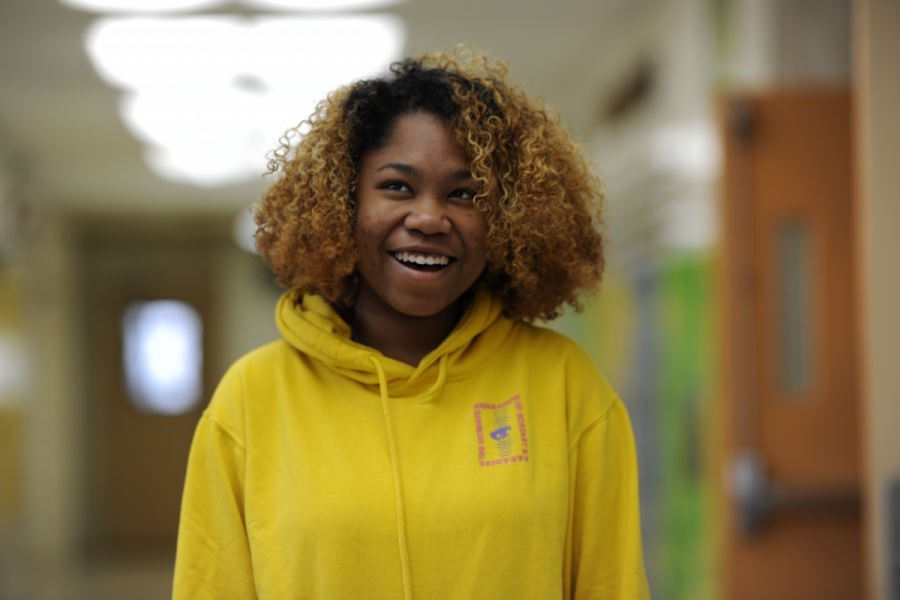Review: ‘Black Panther’ Breaks Barriers
Kilala Vincent ’18 thought that ‘Black Panther’ was exhilarating and hopes to see more representation for all cultures in future movies.
Black History Month saw the release of Marvel’s ‘Black Panther,’ the first movie headlining a black superhero and a nearly all black cast. The film is considered a cultural phenomenon and has sparked conversation across social media.
Starring a 90% black cast that includes Chadwick Boseman, Michael B. Jordan, and Oscar-winning Kenyan actor Lupita Nyong’o, ‘Black Panther’ takes place in the fictional African city of Wakanda. Instead of the stereotypical stagnant African society that we have grown accustomed to seeing in American film and news, Wakanda is portrayed as an advanced metropolis of skyscrapers and spaceships, a vision for the future of African society. “The city of Wakanda is much more advanced than any city in reality, but it depicts Africa in a positive light by giving its people the potential to grow as a civilization far beyond what others thought they were capable of,” said Daniel Yoh ’18.
‘Black Panther’ preserves the rich cultures of African society by portraying African languages and traditional clothing. The characters speak the African languages of Xhosa and Hausa and wear traditional African clothing. The Dora Milaje bodyguards wear costumes modelled after the clothing of the Masai people of Kenya, and Queen Mother Ramonda wears a headdress similar to the Zulu women’s headwear of South Africa. In various scenes, characters
In addition to the representation of black culture, ‘Black Panther’ is a celebration for black women. Director Ryan Coogler portrays women as empowered individuals by veering them away from typical sidekick roles and giving them strong, expressive voices. Many prominent roles are attributed to female actors, including the Wakandan general, Okoye, and T’Challa’s sister, Shuri. They represent the leadership and intelligence that women are capable of, but are usually not given, in American movies. Okoye’s role as general is relatively uncommon in movies, but she promotes the ability of women to fight and lead armies. Shuri’s ability in the lab is representative of the potential that women, especially those of color, have to succeed in the STEM fields. For black women, these characters represent their beauty and intelligence and affirms their humanity. For black women, these characters inspire them to believe that anything is possible.
It was believed that a diverse cast might lead to lower box office revenue from viewers abroad due to discrimination against African Americans. In previous films, white actors have played characters of different ethnicities, namely Scarlett Johansson, who played the Japanese cyborg Motoko Kusanagi in ‘Ghost in the Shell’ and Angelina Jolie, who played the African American character of Fox in ‘Wanted.’ However, this method of film production has been criticized since last year’s Academy Awards, where only white actors were nominated. Outrage from people has brought the issue of representation and diversity into the spotlight. The almost exclusively black cast of ‘Black Panther’ marks a breakthrough in the film industry’s practice of whitewashing. The movie repels negative assumptions about casting diverse actors. “The fact that the casting directors actually decided to cast black actors and actresses was an incredibly powerful statement, particularly because of the ‘whitewashing’ that Hollywood is known for,” said Vivian Ma ’18.
Coogler portrays the struggles of black individuals through the stories of the characters of Wakanda to create a sense of kinship between the characters and viewers. Killmonger embodies black suffering and anguish through his experiences and his background. He grew up in an impoverished neighborhood filled with gun violence and discrimination, much like the communities that many African Americans live in. Coogler ensures that Killmonger’s pain will spark recognition and understanding of the struggles that the black community faces. “I think that the movie teaches the world how the black community has suffered and been put down.”
“It mentions the poverty and the misery that the black community has had to face at the hands of our government and that of many other governments,” said Kilala Vincent ’18.
Marvel’s latest movie not only embodies cultural representation for African Americans, but also represents a turning point for ethnic variety in the film industry. Reaching $400 million in revenue at the box office in just ten days, ‘Black Panther’ will undoubtedly leave a legacy for not only the Marvel Cinematic Universe and the box office, but also for black culture as a whole.
Winni You is a Staff Reporter for ‘The Science Survey’ and a Groups Section Editor for ‘The Observatory’ yearbook. Winni finds journalism appealing...

